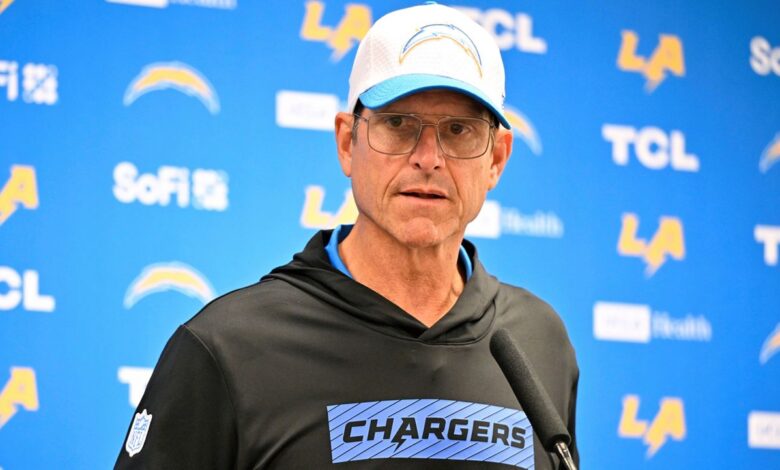Jim Harbaugh: The Unconventional Genius of American Football

Jim Harbaugh is one of the most intriguing and polarizing figures in American football. Known for his fierce competitiveness, bold strategies, and unique coaching philosophy, Harbaugh has carved a distinct path in both college football and the NFL. From leading the San Francisco 49ers to the Super Bowl to revitalizing the University of Michigan’s football program, his journey is filled with dramatic highs, public scrutiny, and undeniable success. This article explores the life, career, coaching style, and legacy of Jim Harbaugh — a name that commands attention in every football conversation.
Early Life and Background
A Football Family
Born on December 23, 1963, in Toledo, Ohio, Jim Harbaugh was destined to be involved in football. His father, Jack Harbaugh, was a college football coach, which meant that Jim grew up surrounded by the sport. He moved frequently during his childhood as his father took on various coaching jobs, but football remained the one constant.
College Years
Jim Harbaugh attended the University of Michigan, where he played quarterback under head coach Bo Schembechler from 1983 to 1986. His leadership and accuracy made him one of the top college quarterbacks of his time. In his senior year, Harbaugh led Michigan to the Rose Bowl and finished third in the Heisman Trophy voting.
NFL Playing Career
Time on the Field
Harbaugh was selected by the Chicago Bears in the first round of the 1987 NFL Draft. Over a 15-year playing career, he also played for the Indianapolis Colts, Baltimore Ravens, San Diego Chargers, and briefly for the Detroit Lions and Carolina Panthers. His most notable moment came in 1995 when he led the Colts to the AFC Championship Game and was named NFL Comeback Player of the Year.
Transition to Coaching
Early Coaching Roles
After retiring as a player, Jim Harbaugh wasted no time transitioning to coaching. He began as the quarterbacks coach for the Oakland Raiders in 2002 and quickly developed a reputation for his ability to mentor and inspire players.
Stanford University
In 2007, Harbaugh became the head coach at Stanford University. At the time, the program was struggling, but within four years, he turned it into a national powerhouse. Under his leadership, Stanford posted an 11-1 season in 2010 and defeated Virginia Tech in the Orange Bowl. His most notable achievement at Stanford was developing quarterback Andrew Luck into a future NFL star.
NFL Coaching Success with the 49ers
A Dramatic Turnaround
Jim Harbaugh took over as head coach of the San Francisco 49ers in 2011. The team had missed the playoffs for eight straight seasons before his arrival. Harbaugh’s impact was immediate — he led the 49ers to a 13-3 record and an NFC Championship Game appearance in his first year.
The Super Bowl Run
In 2012, Harbaugh guided the 49ers to Super Bowl XLVII, where they faced the Baltimore Ravens, coached by his brother, John Harbaugh. Dubbed the “Harbaugh Bowl,” the game was a dramatic affair that ended in a narrow loss for Jim’s 49ers. Despite the defeat, his reputation as one of the top coaches in the NFL was firmly cemented.
Departure and Controversy
After three consecutive NFC Championship appearances, tensions reportedly grew between Harbaugh and 49ers management. The 2014 season saw a dip in performance, and Harbaugh parted ways with the team at the end of the year. Though his NFL coaching stint was relatively short, his winning percentage and influence were undeniable.
Reviving the Michigan Wolverines
Return to Ann Arbor
In December 2014, Jim Harbaugh returned to his alma mater, the University of Michigan, as head coach. Expectations were sky-high, and Harbaugh didn’t disappoint. He brought a sense of urgency and discipline to the program and quickly made Michigan relevant again in the college football landscape.
Notable Achievements
Harbaugh’s tenure at Michigan has been marked by consistent success, including multiple 10-win seasons, top national rankings, and strong recruiting classes. In 2021 and 2022, Michigan won back-to-back Big Ten Championships and earned College Football Playoff berths. These achievements silenced many of his critics and reaffirmed his coaching prowess.
Jim Harbaugh: A Complex Personality
Passion and Intensity
Few coaches exhibit the same level of passion on the sidelines as Jim Harbaugh. His animated gestures, emotional outbursts, and relentless drive reflect his deep love for the game. He demands excellence from his players and often leads by example.
Controversial Moments
Harbaugh’s career has not been without controversy. From heated sideline disputes to unorthodox recruiting tactics, he has often found himself in the spotlight for reasons beyond football. Yet, these controversies have only added to his mystique, making him one of the most talked-about figures in the sport.
Relationship with Players
Former players frequently speak highly of Harbaugh’s leadership. He is known for being fiercely loyal and for pushing his athletes to achieve their potential. While his methods may not always be conventional, the results often speak for themselves.
Coaching Philosophy and Style
Fundamentals and Discipline
At the core of Harbaugh’s coaching style is a commitment to fundamentals — blocking, tackling, and mental toughness. He emphasizes discipline, preparation, and accountability, values that resonate both on and off the field.
Offensive Innovation
While Harbaugh is often associated with old-school football, his offensive schemes have shown adaptability and creativity. Whether it’s using a power running game or deploying creative formations, his play-calling reflects a deep understanding of the game’s nuances.
Player Development
One of Harbaugh’s greatest strengths is developing talent. From college quarterbacks to NFL linemen, he has a proven track record of maximizing player potential. This ability to nurture athletes has made his programs consistent contenders.
Jim Harbaugh’s Broader Impact on Football
Cultural Icon
Beyond the Xs and Os, Jim Harbaugh has become a cultural figure in the football world. His khaki pants, quirky interviews, and fiery press conferences have made him a fan favorite and media magnet.
Mentor to Many
Numerous coaches and players who worked under Harbaugh have gone on to achieve success in their own right. His coaching tree includes names who have become head coaches and coordinators across the NFL and NCAA.
Champion of Education and Athletics
Harbaugh has consistently emphasized the importance of education. At Michigan, he has promoted academic success alongside athletic achievement, reinforcing the idea that student-athletes should excel both in the classroom and on the field.
Heading: The Legacy of Jim Harbaugh
Jim Harbaugh’s legacy is one of resilience, innovation, and relentless pursuit of greatness. Whether you admire his methods or question his eccentricities, there’s no denying his impact on the game of football. From college stadiums to the Super Bowl stage, Harbaugh has left an indelible mark everywhere he’s coached. His journey is a testament to the power of passion, hard work, and unwavering belief in oneself.
Conclusion
Jim Harbaugh continues to be a compelling figure in the world of sports. His career, defined by bold decisions and undeniable success, offers valuable lessons in leadership, perseverance, and adaptability. Whether he’s shouting from the sidelines, mentoring young athletes, or facing off against his brother in a historic Super Bowl, Harbaugh embodies the spirit of competitive excellence. As he writes the next chapter of his coaching story, fans and critics alike will be watching — because when it comes to football, few do it quite like Jim Harbaugh.





